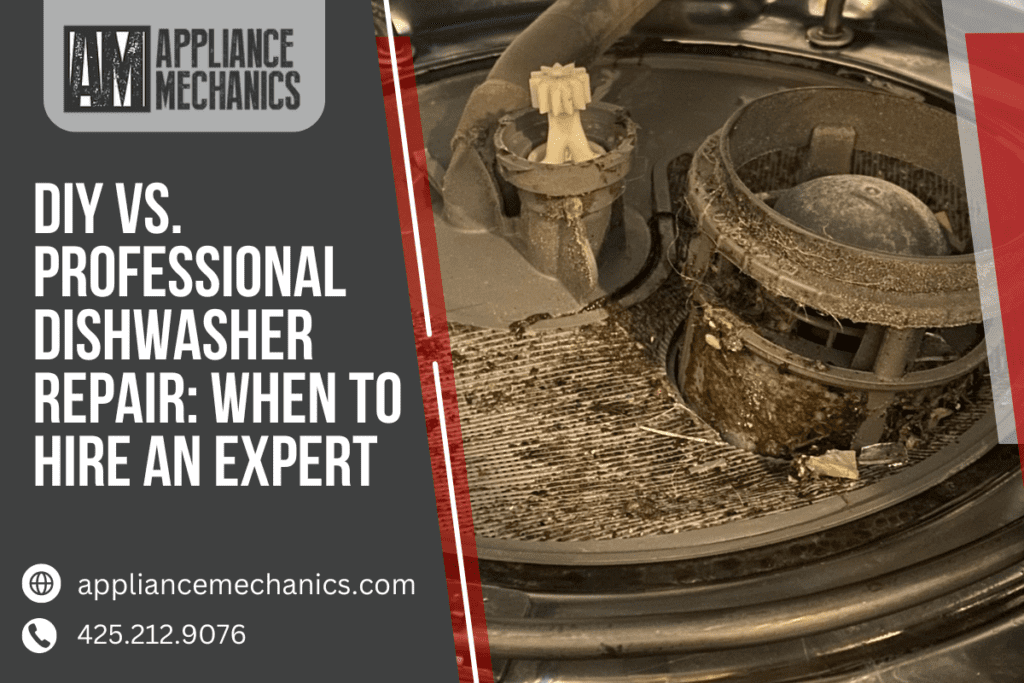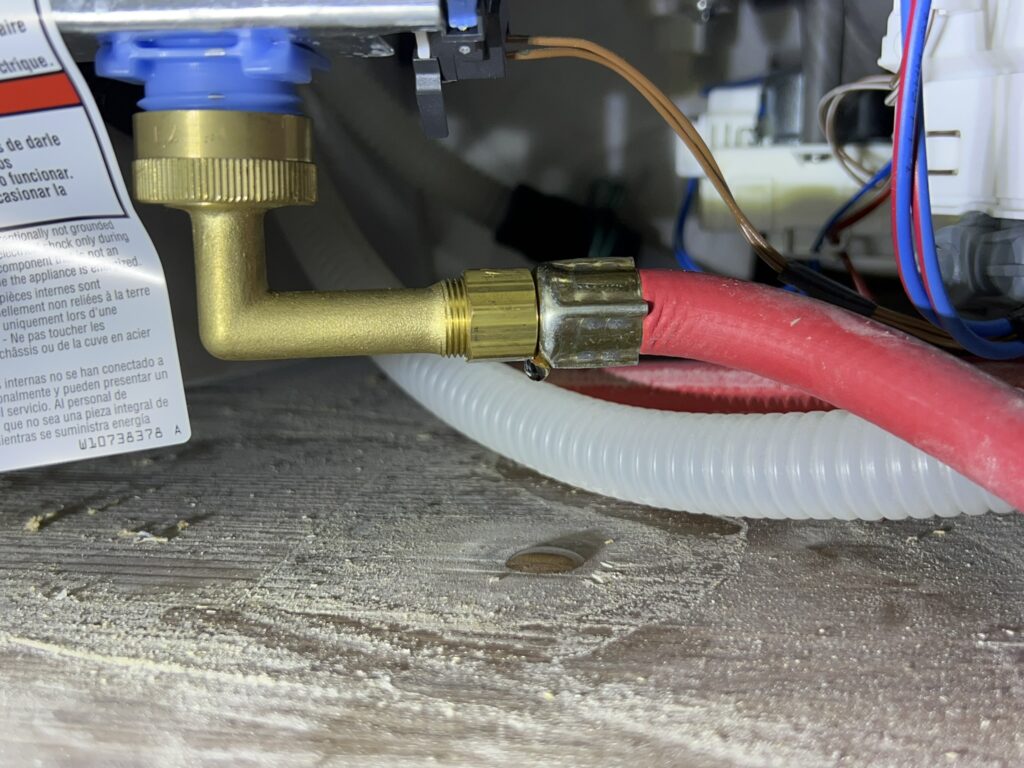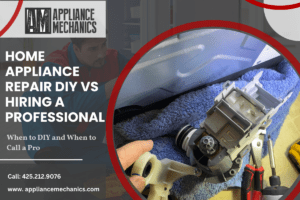
Here’s an overview:
- Introduction to Dishwasher Maintenance: When to DIY vs. Professional Help
- Recognizing Dishwasher Distress: Early Signs of Trouble
- Dishes Aren’t Coming Clean: Persistent Residue and Spots
- Water Woes: Leaks, Puddles, and Drainage Issues
- Strange Noises: Deciphering Groans, Buzzes, and Bangs
- Cycle Confusion: Dishwasher Not Completing or Starting Cycles Properly
- Warning Lights and Error Messages: Understanding Your Dishwasher’s SOS
- The Impact of Inefficient Loading: Overcapacity and Obstructions
- Age and Wear: When Your Dishwasher’s Lifespan Signals a Call for Help
- Professional Intervention: The Risks of Postponing Repair
- Choosing the Right Repair Service: Tips for Finding Reliable Help
- Post-Repair: Maintenance Tips to Keep Your Dishwasher Running Smoothly
- Recap: The Importance of Addressing Dishwasher Issues Promptly
Introduction to Dishwasher Maintenance: When to DIY vs. Professional Help
Keeping your dishwasher in tip-top shape is key for its effectiveness and longevity. Knowing when you can handle maintenance and repairs on your own, versus when it’s best to bring in professionals, is crucial. Keep these points in mind:
- Complexity of the Issue: Simple tasks like cleaning filters are DIY-friendly. Complex problems call for professional expertise.
- Safety Concerns: If electrical components are involved, consulting a professional is safer.
- Warranty Status: DIY repairs can void warranties. Check your policy before proceeding.
By weighing these considerations, you’ll ensure the longevity and efficiency of your dishwasher.
Recognizing Dishwasher Distress: Early Signs of Trouble
Your dishwasher often gives early warning signs when it’s in distress. Pay attention to the following indicators:
- Unusual Noises: Grinding or loud noises may signal a hard object has fallen inside, or could indicate motor issues.
- Water not Draining: If water remains after a cycle, it could point to a clogged drain or malfunctioning pump.
- Dishes not Properly Cleaned: When dishes come out dirty, spray arms, filters, or water supply issues may be to blame.
- Leaks: Water on the floor is a clear sign. A faulty door seal, loose connection, or cracked tub could be the cause.
- Error Codes: Modern dishwashers display error codes that hint at underlying problems, referencing the manual can provide more insight.
Address these signs promptly to prevent further damage or a possible breakdown.
Dishes Aren't Coming Clean: Persistent Residue and Spots
Several issues could be at play when your dishes emerge with residue or spots. Consider these DIY steps first:
- Examine the spray arms for clogs and clean the holes with a toothpick.
- Check the dishwasher filter and clean it thoroughly to remove trapped food particles.
- Inspect the water temperature; it should be hot enough (at least 120°F) to effectively dissolve detergent and rinse aid.
- Use the proper detergent and rinse aid; experiment with different brands or quantities if necessary.
Hard water or a malfunctioning component might be to blame if these steps don’t resolve the issue. At this point, consult a professional to assess and repair your dishwasher, especially if technical expertise is required.
Water Woes: Leaks, Puddles, and Drainage Issues
When your dishwasher begins to leak, or you notice puddles of water around it, it’s important to act promptly. These symptoms often point to worn gaskets, loose hose connections, or clogged drains. While replacing gaskets or tightening hoses might be within your DIY capabilities, drainage problems can be more complex.
- Inspect door seals and gaskets for wear and tear.
- Check the hoses behind the dishwasher for any signs of leakage.
- Ensure the dishwasher is level to prevent water from pooling under the unit.
- Clear any food debris or obstruction in the drain filter and hose.
Consider consulting a professional if these steps don’t resolve the issue, as prolonged water exposure can damage your kitchen flooring and cabinetry, leading to more costly repairs.

Strange Noises: Deciphering Groans, Buzzes, and Bangs
If your dishwasher starts sounding odd, figuring out what each noise means can help you decide whether you can fix it yourself or if you need to call in a pro.
- Groaning or Humming: This can be the sound of the dishwasher motor. If it’s louder than usual, the motor might be straining due to a blockage or wear.
- Buzzing: Often related to the water pump or electronic controls. Buzzing can be normal, but persistent or loud buzzing might signal an issue with these components.
- Banging: A sudden, loud noise like banging could be caused by items knocking against each other or the spray arm hitting a dish. Rearrange your dishes. If that doesn’t help, the issue might be with the arm’s mechanics.
Cycle Confusion: Dishwasher Not Completing or Starting Cycles Properly
When your dishwasher fails to complete or start cycles, it’s often due to:
- Faulty door latches
- Malfunctioning electronic controls
- Blocked or defective water supply
For simple problems, like making sure the door is shut tight or looking for twists in the water hose, you can usually fix it yourself. But, if it’s something complicated, like issues with the dishwasher’s electronics or the parts inside it, it’s better to call in a pro. They have the right tools and know-how to fix the tricky stuff safely and effectively, avoiding more damage or dangers.
Warning Lights and Error Messages: Understanding Your Dishwasher's SOS
Your dishwasher is designed to communicate issues through warning lights and error messages. If these signs appear:
- Flashing lights might indicate a problem with the dishwasher’s system. It could be a simple issue like a door not properly closed or something more complex requiring expert attention.
- Error codes are your dishwasher’s language for specific faults. Refer to your dishwasher’s manual to interpret these codes. Simple errors may only necessitate a reset, while others could signal a component malfunction.
- Beeping sounds can accompany lights and codes, alerting you to immediate issues. Persistent beeping might suggest a power fault or a problem with the electronic control panel.
The Impact of Inefficient Loading: Overcapacity and Obstructions
When you overload your dishwasher or arrange dishes poorly, you risk compromising the appliance’s effectiveness. Overcapacity can lead to:
- Dishes blocking spray arm movement, preventing a thorough clean.
- Water and detergent failing to reach all surfaces, resulting in residue.
- Inefficient draining that may cause water to pool and foods to re-adhere to dishes.
Improper loading affects cleaning outcomes and can strain the motor and potentially shorten the dishwasher’s lifespan. If you encounter persistent problems due to loading mistakes, consulting a professional for repair or guidance may be a wise choice to prevent further damage.
Age and Wear: When Your Dishwasher's Lifespan Signals a Call for Help
As your dishwasher ages, wear and tear are inevitable, leading to a decline in performance and more frequent breakdowns. Generally, dishwashers last about ten years. If yours is approaching or has surpassed this age, it’s wise to recognize the signs that service is due:
- Strange Noises: Grinding or banging sounds indicate a failing motor or loose parts.
- Leaks: Water on the floor isn’t just a nuisance. It suggests seal or pump issues.
- Poor Cleaning Results: Water jets or heating elements might malfunction when dishes remain dirty.
- Visible Rust or Cracks: These are clear indicators that your dishwasher’s integrity is compromised.
Consider getting professional help if you notice any of these signs. They can assess whether it’s more cost-effective to repair or replace.
Professional Intervention: The Risks of Postponing Repair
Prioritizing professional dishwasher repair is always a good idea to ensure proper functioning and avoid further damage. Timely repairs save you money in the long run and prevent unnecessary inconvenience and stress.
- Increased Damage: Small malfunctions can cascade into major issues, resulting in costlier repairs.
- Efficiency Loss: A faulty dishwasher uses more water and energy, increasing utility bills.
- Safety Hazards: Electrical problems or water leaks can pose significant risks to your home and safety.
- Inconvenience: The longer you wait, the more dishes pile up, disrupting your daily routine.
- Shortened Appliance Lifespan: Continuous use of a damaged dishwasher can lead to premature failure.
Considering these risks, seeking timely professional intervention can save you money and time and help you avoid potential dangers.
Choosing the Right Repair Service: Tips for Finding Reliable Help
If your attempts to fix your dishwasher have failed, it may be time to seek professional help. To select a trustworthy dishwasher repair service, consider the following tips:
- Research local services, checking for certifications and licenses.
- Read reviews and request references to assess reputation.
- Confirm warranty and insurance coverage to protect against future issues.
- Ask about their experience with your dishwasher’s brand and model.
- Compare quotes, but don’t base your decision on price alone—quality matters.
- Ensure the technician provides a clear explanation of the issue and repair plan.
- Ask about the availability of spare parts and the timeframe for repair completion.
These steps will help you find competent and trustworthy repair help for your appliance.
Post-Repair: Maintenance Tips to Keep Your Dishwasher Running Smoothly
After your dishwasher is repaired, follow these maintenance tips to ensure it continues to operate efficiently:
- Inspect and Clean the Filters Regularly: Check the filters for food debris and clean them monthly to prevent clogs.
- Wipe the Gaskets: Keep the door seals free of food particles and mild buildup by wiping them with a damp cloth.
- Use Rinse Aid: Rinse aid can help prevent spots and enhance drying. Make sure to refill it as needed.
- Run Hot Water Before Starting: Ensure better cleaning by running the sink’s hot water until it’s hot to the touch, then start the dishwasher.
- Don’t Overload: Overloading can lead to poor washing and potentially damaged parts. Load according to the manufacturer’s instructions.
- Clean the Spray Arms: Occasionally, inspect the spray arms for clogs and gently clean the nozzles to maintain water flow.
- Check for Hose Kinks: Ensure the water inlet and drainage hoses aren’t kinked or obstructed to prevent water flow issues.
Maintaining your dishwasher with these simple steps can prolong its lifespan and help avoid the need for future repairs.
Recap: The Importance of Addressing Dishwasher Issues Promptly
Ignoring dishwasher problems can lead to bigger, more costly issues down the line. It’s essential to address any abnormalities or malfunctions immediately because:
- Prevent Water Damage: Leaks can cause extensive and expensive damage to your home.
- Maintain Efficiency: A well-maintained dishwasher saves on energy and water bills.
- Hygiene and Health: Dishwashers not functioning properly can harbor bacteria.
- Avoid Inconvenience: Delayed repairs can lead to a non-functional dishwasher, interrupting your daily routine.
- Cost-Effective: Early repairs can prevent the need for more significant, more expensive fixes or even replacement.
Taking action swiftly ensures your dishwasher remains in top shape, safeguarding your investment and day-to-day convenience.
FAQ's
What routine maintenance tasks can I perform on my dishwasher to prevent common problems?
Regular maintenance is crucial for keeping your dishwasher in good condition. Key tasks include cleaning the filter monthly to remove food particles and debris, checking and cleaning the spray arms to ensure they are not clogged, and wiping down the door gaskets to prevent leaks. It’s also beneficial to run hot water in your sink before starting the dishwasher to ensure the water is hot enough for effective cleaning right from the start of the cycle.
How do I know if a dishwasher problem is something I can fix myself or if I need professional help?
Simple issues such as clogged filters, minor leaks from loose connections, or error messages that require a reset can often be handled DIY. However, if you encounter problems involving the dishwasher’s electrical system, complex mechanical issues, or extensive water leakage, it’s safer and more effective to call in a professional. Always consult your dishwasher’s manual for troubleshooting tips and consider the warranty implications of DIY repairs.
What are the signs that my dishwasher may need to be replaced rather than repaired?
Dishwashers typically have a lifespan of about ten years. Signs that replacement might be more cost-effective than repairs include consistent malfunctions despite multiple repairs, severe physical damage like a cracked tub, persistent poor cleaning performance, or escalating repair costs nearing the price of a new unit. If your dishwasher is approaching or has exceeded its expected lifespan and is showing signs of significant wear, it may be time to consider replacement.



